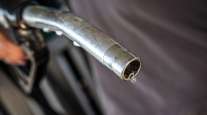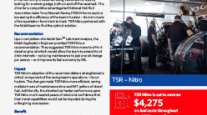Diesel Average Rises to $3.333 in Sixth Consecutive Increase
This story appears in the Jan. 17 print edition of Transport Topics.
The average price of a gallon of U.S. retail diesel rose by 0.2 cent last week to $3.333, the Department of Energy reported, while the regular gasoline price average climbed 1.9 cents to $3.089.
Meanwhile, DOE significantly increased its 2011 fuel price forecast by 17 cents.
“There’s been some problems with gasoline supply on the East Coast over imports from Europe, and U.S. gasoline inventories are just at their normal historical levels, while distillate supplies are robust . . . . And that’s why diesel hardly moved, while gasoline rose higher,” Neil Gamson, an economist at DOE’s Energy Information Administration, told Transport Topics.
Diesel and gasoline prices have both risen for six straight weeks, with diesel increasing 17.1 cents during that span and gasoline jumping 23.3 cents.
These increases left diesel 45.4 cents more expensive than the comparable week of 2010, while gasoline is now 33.8 cents higher, DOE said.
Crude oil has remained stable in recent weeks, closing at $91.86 a barrel on Jan. 12, up slightly from its close Dec. 23 on the New York Mercantile Exchange at $91.51, Bloomberg News reported.
EIA said in its monthly Short-Term Energy Outlook released on Jan. 11 that it expects diesel to average $3.40 a gallon in 2011, up from December’s forecast of $3.23. It said that gasoline would average $3.17 a gallon for 2011, also a 17-cent increase from its December projection.
The agency also said crude will average $93 a barrel, which is about $14 higher than the 2010 average.
“We’ve raised our forecasts on crude oil, diesel and gasoline prices significantly,” Gamson said. “This is mainly based of our view that the global economic situation is improving, and therefore, global demand for crude and all kinds of fuel will rise, putting upward pressure on prices here.”
EIA’s report cautioned that “significant uncertainty [is] surrounding the forecast,” and there is a 10% chance that gasoline could rise above $4 a gallon in August and September.
EIA did not forecast how high diesel could go, but commercial trucking’s main fuel has been consistently higher than gasoline in recent years.
Two trucking firms that have bought significant numbers of new tractors with 2010-compliant engines said they are saving money on fuel because the vehicles are getting better fuel economy than older models.
Dean DeSantis, president of Heritage Transport, a subsidiary of Heritage Environmental Services, Indianapolis, said the fleet rotated 52 of its 217-truck fleet with vehicles containing 2010 engines.
“We replaced them mainly because of age and high mileage,” DeSantis told TT. “We were also aware than the manufacturers told us they would get improved fuel mileage.”
“We found that compared to the 2007 to ’09 vehicles, our results completely supported manufacturer claims of increased fuel economy,” DeSantis said.
He said that trucks built to meet 2007-09 EPA standards averaged 5.43 miles per gallon, versus 5.9 for the new engines. He added that some trucks get as much as 6.1 mpg.
Bryan Burningham, director of maintenance at Challenger Group, Cambridge, Ontario, said the company already is operating 150 trucks that meet 2010 standards and some have as many as 400,000 miles on them.
“We spec’d these new trucks and trailers for maximum fuel efficiency,” Burningham told TT. “All of them are the most aerodynamic models of two different manufacturers and all SmartWay approved.”
Challenger ordered super single tires for its new vehicles, put air deflectors on the top of the cab and side skirts on all new trailers, and checks air pressure of them at each refueling stop at one of the firm’s terminals.
“It’s hard to say exactly by how much, but they definitely get better fuel mileage than both the ’07 and ’04 technology trucks,” Burningham said. “It’s also not known yet how much is due to the engines, because we used to buy trucks with a lot of drag, but now, everything is clean and pure.”
“The biggest concern we have is that it’s much costlier to run these trucks, mainly because of unexpected maintenance,” DeSantis said.




